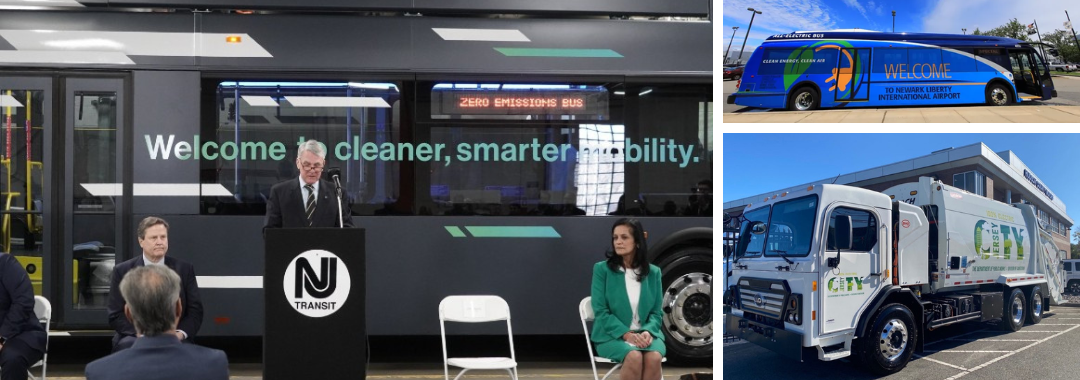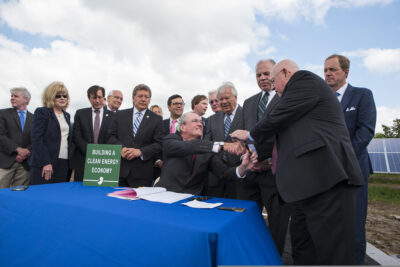
Governor Phil Murphy signed energy legislation and issued an Executive Order to prepare a Statewide Energy Master Plan in 2018. OIT/Governor’s Office.
In recent years, New Jersey has been a national leader in promoting vehicle electrification. The state has taken a multi-pronged approach that promotes electrifying the state fleet, supports local governments looking to electrify their fleets, and provides incentives for companies and consumers to adopt electric vehicles. The state is focusing particularly on reducing emissions in overburdened or environmental justice communities that have historically experienced more pollution.
In January 2020, the state of New Jersey issued the New Jersey Energy Master Plan that included a goal that New Jersey have 100 percent clean energy by 2050 and outlined seven key strategies for achieving the goal. In the same year, the state adopted a law establishing its goals for electric vehicles (EV), providing specific benchmarks with timelines. Strategies for reducing emissions in the transportation sector include reducing vehicle miles traveled and increasing the use of electric vehicles. Additionally, on July 9, 2021, Governor Murphy signed a package of laws to support electric vehicle infrastructure throughout the state. These new laws, along with existing initiatives, are helping the state move toward a zero-emission transportation sector.
One of the more notable sources of funding for these initiatives is the Regional Greenhouse Gas Initiative (RGGI), a collaborative effort with 10 other states in the region that sets a cap on how much carbon dioxide can be emitted. Companies bid on the right to emit carbon through an auction system, and auction proceeds are invested into clean energy initiatives. Another major source of funds is money received from the Volkswagen settlement; as a penalty for installing devices to cheat emissions tests, Volkswagen (VW) agreed to pay into a trust fund to be distributed to states.
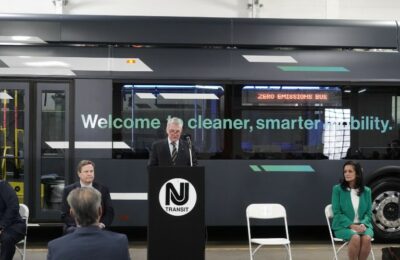
NJ TRANSIT CEO Kevin Corbett unveiling the first NJ TRANSIT bus garage with electric charging capability. Courtesy of NJ TRANSIT.
State Fleet Electrification
New Jersey has been on the forefront of investing to electrify the state vehicle fleet, focusing on New Jersey Transit (NJ TRANSIT) buses. The state has allocated $15 million in RGGI and VW funding to purchase electric buses. The 2020 legislation establishing EV benchmarks aims for 10 percent of the buses NJ TRANSIT purchases to be zero-emission by 2024 and increasing to 100 percent by the end of 2032. If attained, these goals should help NJ TRANSIT have a zero-emissions bus fleet by 2040.
NJ TRANSIT is already preparing for the transition to electric buses. The renovation of the Newton Avenue Bus Garage in Camden has been completed to make it suitable for electric buses, and the agency plans to start deploying electric buses in Camden by the end of 2022. The agency recently awarded a contract to a private firm to modernize and ready its bus garage in Maplewood for electric buses and to conduct a systemwide survey and condition assessment of its 16 bus garages to identify the upgrades needed to support zero-emissions buses. This follows the agency’s earlier issuance in 2021 of a request for proposal (RFP) for help developing a Zero-Emission Bus System Design and Investment Planning Study in order to stay on track to meet the goals, and the RFP establishes that the agency will prioritize adoption of electric buses in “low-income, urban, or environmental justice communities,” as these communities are most impacted by pollution from diesel buses.
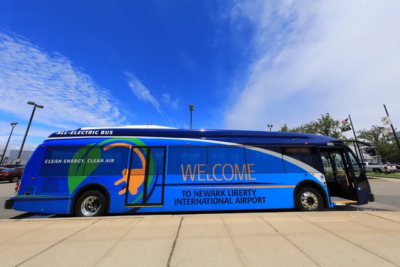
An electric powered bus at Newark Liberty International Airport. NJ TRANSIT plans to have a zero-emission fleet by 2040. Courtesy of the Port Authority of New York and New Jersey.
The New Jersey Department of Transportation (NJDOT) is also working to electrify the state fleet. The agency has purchased 50 electric vehicles and will have 125 fully electric vehicles by 2025, reducing carbon emissions by two million pounds annually. Additionally, NJDOT is working to support the electrification of other state vehicles. Together with Princeton University, NJDOT has completed multiple phases of a plan to identify the necessary infrastructure for an all-electric state fleet and prioritize where to install charging stations. This work will help ensure the gradual transition toward an electric fleet is done smoothly and intelligently.
State Supporting Local Government Fleet Electrification
In addition to converting the state fleet to electric vehicles, New Jersey is committed to helping local governments make the same transition. The State has used RGGI and VW funding to help local governments purchase electric school buses, ambulances, garbage trucks, trucks, shuttle buses, and dump trucks. Funding can also be used to support EV infrastructure such as charging stations and to support equitable mobility projects. These e-mobility projects provide electric car sharing and ride hailing services in “low- and moderate-income communities disproportionately impacted by pollution.” To improve the quality of life of children in low- and moderate-income communities, $13 million of the RGGI and VW funding is set aside for purchase of electric school buses and shuttles. Agencies can apply to the New Jersey Department of Environmental Protection (NJDEP) for grants.
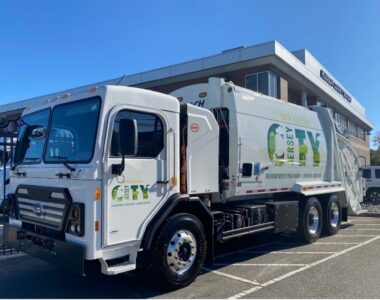
One of the five fully electric garbage trucks deployed in Jersey City, the first in New Jersey. Courtesy of BYD.
One notable success has been the deployment of electric garbage trucks in Jersey City in December 2021. The city purchased five garbage trucks, supported by $2 million in grants from the RGGI and VW funds. These are the first trucks of their kind in New Jersey and the largest deployment in the United States to date. While the trucks are currently not used for residential trash pick-up and are mainly used to help clean parks and business districts, they show that the state is at the forefront of adopting new electric vehicle technologies, helping to lay the groundwork for expanded use in New Jersey and elsewhere.
A notable leader in local government fleet electrification is Paterson. Paterson recently approved the purchase of two electric ambulances with NJDEP providing funding support. Ambulances spend a lot of time idling and the transition to electric ambulances will improve the air quality in Paterson and surrounding areas. The ambulance purchase continues Paterson’s efforts to go electric after they purchased 35 Nissan Leaf vehicles for the city fleet last year.
Another EV project that NJDEP is supporting is the GOTrenton! program, run by Isles, Inc., that supports EV access in Trenton. The program includes a carsharing service, a ridesharing service, a shuttle service, and related infrastructure such as charging stations. While the program is open to everyone, Isles took particular care in the site selection process to make sure that low-income communities would benefit the most from the program. The program will also create new jobs for people living in Trenton; it is expected to launch later this year.
State Supporting Port Electrification
New Jersey is also working on electrifying vehicles that operate out of Port Newark, the largest port on the east coast. Much of the transportation within the port is done via “drayage” vehicles that move cargo primarily within the port and shorter distances to nearby warehouses and distribution facilities. These vehicles tend to be older, diesel-powered, and a major source of emissions. Reducing pollution near the port is particularly important because the port is near areas like Newark and Elizabeth that fall under the definition of overburdened communities that NJDEP has determined are “in need of environmental justice.” These communities would be some of the main beneficiaries of port electrification.
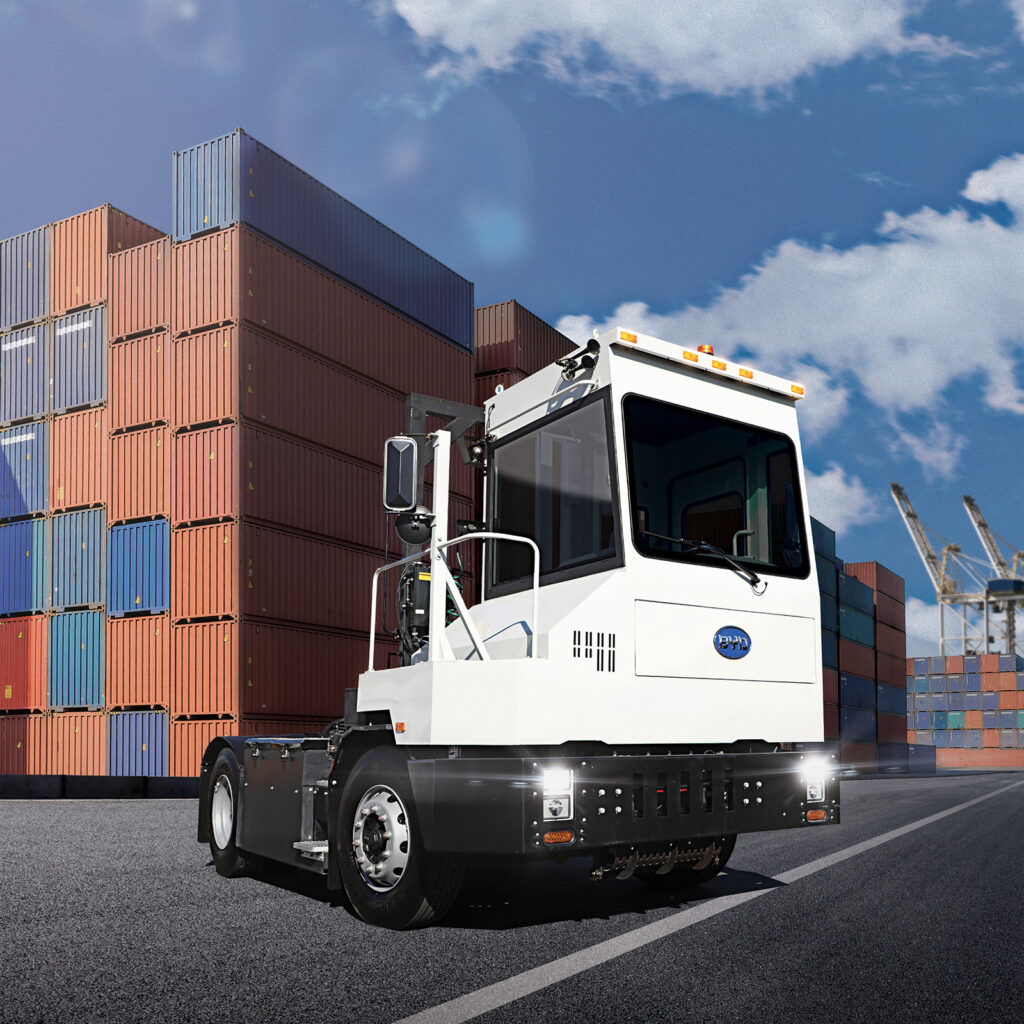
In 2019, over $3.5 million was allocated for the purchase of 14 electric yard tractors in Port Newark. Courtesy of BYD.
RGGI and VW money has been allocated to the purchase of different types of vehicles at the port, including forklifts, trucks, and tractors. Ten electric tractors were first introduced to Port Newark in 2021 and money has been allocated for ten additional tractors. In total, more than $19 million has been allocated to the acquisition of electric vehicles on and around Port Newark, demonstrating that cleaning up ports in particular is a priority for the state given the environmental justice gains to be made.
Resources
Dragone, Gabriella. (2022, June 15). City Council Approves Grants to Purchase Electric Ambulances, Utility Trucks. https://www.tapinto.net/towns/paterson/sections/police-and-fire/articles/city-council-approves-grants-to-purchase-electric-ambulances-utility-trucks
Dragone, Gabriella. (2021, November 5). Paterson Drives Into Greener Future with New Electric Vehicles. https://www.tapinto.net/towns/paterson/sections/green/articles/paterson-drives-into-greener-future-with-new-electric-vehicles
Evans, Tim. (2021, October 13). New Jersey Future. Electric Yard Goats and Environmental Justice. https://www.njfuture.org/2021/10/13/electric-yard-goats-and-environmental-justice/
Isles, Inc. (2022). Climate Action and GOTrenton! https://isles.org/our-approach/live-green-and-healthy/climate-action-ev/
Morill, Aaron (2021, November 16). Jersey City’s Garbage Trucks go Electric. Jersey City Times. https://jcitytimes.com/jersey-citys-garbage-trucks-go-electric/
NJDEP. (2022). Overview of Distribution of Mitigation Funds. https://www.state.nj.us/dep/vw/project.html
NJDEP. (2022). Regional Greenhouse Gas Initiative (RGGI). https://www.nj.gov/dep/aqes/rggi.html
NJDEP. (2002). Stop the Soot. https://www.state.nj.us/dep/stopthesoot/sts-retrofits.htm
NJDEP. (2022). What are Overburdened Communities (OBC)?. https://www.nj.gov/dep/ej/communities.html
NJDOT. (2022, February 23). NJDOT Goes Electric. https://www.youtube.com/watch?v=Yv5KDEdfIJQ
NJDOT. (2021, October). New Jersey Fleet Electrification. https://www.njdottechtransfer.net/wp-content/uploads/2021/10/1026_NJDOT_EV_ProjectsSummary_Final.pdf
NJ Office of the Governor. (2022). About the Energy Master Plan. https://www.nj.gov/emp/energy/
NJ Office of the Governor. (2021, July 9). Governor Murphy Signs Bills to Advance New Jersey’s Clean Energy Future. https://www.nj.gov/governor/news/news/562021/approved/20210709a.shtml
NJ Transit. (2021). Capital Plan Project Sheets: Bus Fleet. https://njtplans.com/downloads/capital-plan/NJ%20TRANSIT%202021%20Capital%20Plan%20Update%20Appendix%20B%20Project%20Sheets%20Final.pdf
NJ Transit (2021, August 2). NJ TRANSIT Seeks Firms to Study Pathway to Zero Emissions Bus System. https://www.njtransit.com/press-releases/nj-transit-seeks-firms-study-pathway-zero-emissions-bus-system
NJ Transit. (2022, March 22). NJ TRANSIT Unveils New Electric Bus Charging Infrastructure in Camden. https://www.njtransit.com/press-releases/nj-transit-unveils-new-electric-bus-charging-infrastructure-camden
Raja, Nausheen. (2021, March 31). Roadmap to Electrifying New Jersey’s Public Bus Fleet. New Jersey Policy Perspective. https://www.njpp.org/publications/report/roadmap-to-electrifying-new-jerseys-public-bus-fleet/

